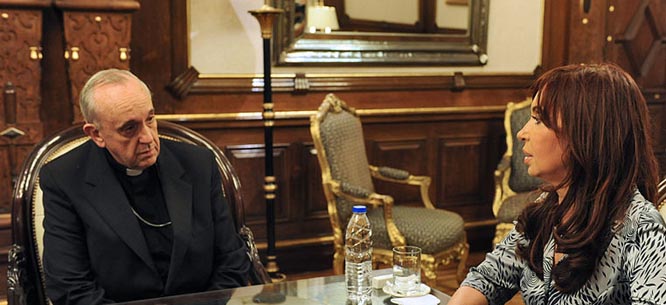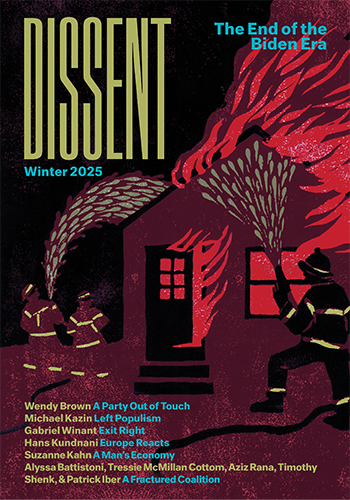A New Pope, More Old Traditions and Shady Associations
A New Pope, More Old Traditions and Shady Associations

Wednesday, March 13, the news broke and took practically everyone by surprise: Cardinal Jorge Bergoglio, from Argentina, had been elected Pope. I was at home, standing at the bottom of the stairs, when I heard the news on television. I screamed—a visceral reaction.
I had been hearing the name Bergoglio for decades back home in Argentina, where I grew up during the dictatorship. This Jorge Bergoglio was the man that in 1977 gave an honoris causa doctorate to Admiral Emilio Massera, the man behind the Escuela Mecanica de la Armada, popularly known as ESMA, the most bloody detention camp of the Argentinian dictatorship. According to Argentinian journalist Walter Goobar, the files pertaining to this doctorate have since mysteriously disappeared from the archives of the Universidad del Salvador. Back then, Jorge Bergoglio was a member of the university’s board. Massera’s doctorate was awarded a month after Orlando Yorio and Francisco Jalics, two Jesuit priests, were found naked and drugged after spending nearly six months at the ESMA.
Both priests placed the blame for their kidnapping and subsequent torture on Jorge Bergoglio, who was then in charge of the Jesuit Order. It was, after all, Bergoglio who stripped them of their functions and, in doing so, removed the protections provided by the church. Shortly thereafter, a paramilitary group delivered the priests to the ESMA. Both had served impoverished communities. They were only freed after the Episcopate agreed to grant an audience to General Roberto Viola and Minister of Economy Jose Martinez de Hoz. A day before the audience, Yorio and Jalics were drugged and transported by helicopter to an open field in the outskirts of Buenos Aires.
During the trial of the juntas in 1985, Orlando Yorio declared (translations from Spanish mine throughout), “Bergoglio never warned us of our impending danger. Moreover, I am convinced it was him who provided our names to the military.” After the trials and on more than one occasion, Yorio stated, “He told my brothers that I had been executed…When I was freed he admitted to me that on two occasions he had been visited by a police officer who informed him of our execution.” Moreover, Yorio insists that Bergoglio visited him during his captivity. He said the other priest, Francisco Jalics, was certain of it even though they were only allowed to receive visits while blindfolded.
Award-winning Argentinian journalist Horacio Verbitsky, who has extensively documented the complicity of the Catholic Church in general and of Bergoglio in particular with the juntas, wrote yesterday in a column at the daily Pagina 12, citing human rights advocate Emilio Mignone, that the new pope “is a paradigm of the kind of pastor that delivers his sheep to the enemy, without bothering to defend them or attempting to rescue them.”
Verbitsky’s investigations of the new pope are nothing new. In 2010, he wrote about Bergoglio’s knowledge of the appropriation of newborn babies and infants during the dictatorship. When pregnant detainees gave birth, it was common for those babies to be given away, under a new identity, to families that had an affinity with the regime. In 1977, Elena de la Cuadra, then pregnant, was kidnapped by the military. When her family approached Bergoglio to find out the baby’s fate, his response was, “The baby is now in the hands of a good family, there is no way to change that.”
Not all polemic surrounding Pope Francis is related to the dictatorship.
In 2010, during the gay marriage debates in Argentina, Bergoglio also had words for LGBTQ advocates, calling their efforts “the works of the devil” and warning that Argentina was being attacked by “darkness.” This is a curious choice of words, considering that a couple of years earlier, Julio César Grassi, a priest sentenced to fifteen years in prison for the sexual abuse of minors, expressed fond memories of Bergoglio, stating that during his ordeal “Bergoglio never abandoned me.” Grassi, who was sentenced for sexual abuse of young boys under his care at the foundation unironically named “Happy Children” (Felices los Niños), regularly met with Bergoglio while in prison. And, according to sources close to the investigation, it was Bergoglio who administered him the sacrament of confession. Grassi said, “I regularly talk to him, he supports me spiritually and he believes in me.”
The new pope does not fare well on gender equality either. During debates involving legislation on abortion rights in the case of rape or grave health risks for the mother, he vehemently expressed his opposition, stating that “abortion is never a solution.” Bergoglio’s influence in national politics runs deep, with some local media claiming that it was his fierce opposition to abortion rights that led the proposed legislation to allow unrestricted access to abortion until the second trimester never to be debated in congress. His relationship with the late former president Néstor Kirchner deteriorated to the point that Kirchner singled him out as “working for the opposition” and, as as noted by political analysts, “attempting to interpelate government from the pulpit.”
If the past thirty years of Cardinal Bergoglio’s career are any indication, we should not have high expectations of change in the Vatican. This pope, like his predecessor, is firmly rooted in old traditions and tainted with shady associations.
Flavia Dzodan is an editor at Tiger Beatdown. Her long-form blog is Red Light Politics.




